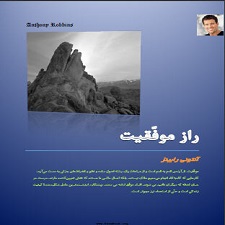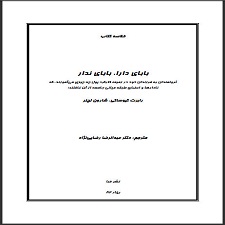توضیحات
ABSTRACT
The paper studies the use of technology management for advanced innovative personnel training for effective scientific, technological, economic and social development of countries, describing cognitive strategies in the sixth and seventh technological cycles. Competency building approach in the new formation of the sixth technological cycle requires the control of cognition process, methods of creating of broad education from information assigned to the subject of knowledge. Cognitive technologies of the sixth technological cycle are oriented to pure cognitive processes and belong to the field of psychology, pedagogy and knowledge, while socio-humanitarian technologies refer to the person, practice, society, ethics, morals, values and culture. It appears in the seventh way of subjectivity environment, subjectivity culture, specially organized and reflective-active environment, making new forms of life on the planet. Historical traditions of the Russian culture and mentality give reasons to be one of the first countries to try to get into the seventh technological cycle.
INTRODUCTION
The paper substantiates the use of technology management for advanced training of innovative personnel for effective scientific and technological, economic and social development of the state. It is well known that the process of entering the number of developed country of the world, as a rule, is implemented in the phase of growth of the next technological cycle. Technological cycle is a number of technologically allied industries. Over two centuries, since 1770, the economies of the leading countries have passed five technological cycles. According to the theory of the Russian economist Nikolai Kondratieff, the scientific and technological progress is cyclical, with the cycle length of approximately 50 years. The life span of a technological cycle includes four phases: depression, revival, prosperity and recession (Syryamkin, 2012). It is important for a country to be in the phase of prosperity of a technological cycle. In Russia, about 10% of production can be related to the fifth and nascent sixth technological cycles. Transition to a new technological cycle will be made by means of a regular technological revolution, increasing the effectiveness of the main industries of the economy. For the present moment Russia is in the process of industrial recovery. The key areas of the formation of the cutting edge technological cycle are biotechnologies, based on advances in molecular biology and genetic engineering, chemical technologies and nano-materials, artificial intelligence systems, global information networks, security, space, military and mechatronic systems, intelligent medicine, cognitive sciences, socio-humanitarian technologies and their convergence.
چکیده
در اين مقاله، استفاده از مديريت فناوري براي آموزش كارآفرينان نوآورانه پيشرفته براي توسعه مؤثر علمي، فناوري، اقتصادي و اجتماعي كشورها، توصيف استراتژي هاي شناختي در چرخه ششم و هفتم، مورد بررسي قرار گرفته است. رویکرد ساختن شایستگی در شکل گیری جدید چرخه فن آوری ششم نیاز به کنترل فرآیند شناخت، روش های ایجاد آموزش گسترده ای از اطلاعات اختصاص داده شده به موضوع دانش دارد. فن آوری های شناختی چرخه فن آوری ششم به فرآیندهای شناختی خالص متمرکز می شوند و متعلق به حوزه روانشناسی، آموزش و دانش هستند، در حالیکه فن آوری های اجتماعی و انسانی به شخص، عمل، جامعه، اخلاق، اخلاق، ارزش ها و فرهنگ اشاره می کنند. در روش هفتم محیط زیست، فرهنگ ذهنی، محیطی ویژه سازمان یافته و بازتابنده فعال و شکل های جدید زندگی در سیاره به نظر می رسد. سنت های تاریخی فرهنگ و ذهنیت روسیه دلیل آن را یکی از اولین کشورها می دانند که سعی در ورود به چرخه فناوری هفتم داشته باشند.
مقدمه
این مقاله، استفاده از مدیریت فناوری را برای آموزش پیشرفته پرسنل نوآورانه برای توسعه مؤثر علمی و فنی، اقتصادی و اجتماعی دولت مورد تأیید قرار می دهد. به خوبی شناخته شده است که فرآیند ورود به شمار کشورهای توسعه یافته در جهان، به عنوان یک قاعده، در مرحله رشد چرخه تکنولوژیکی بعدی اجرا می شود. چرخه فن آوری تعدادی از صنایع تکنولوژیکی متفق است. طی دو قرن، از سال 1770، اقتصادهای کشورهای پیشرو پنج دوره تکنولوژیکی را گذرانده است. بر طبق نظر نیکولای کانترتیف، اقتصاددان روسی، پیشرفت علمی و تکنولوژیکی با سیکل طولی حدود 50 سال است. طول عمر یک چرخه فن آوری شامل چهار مرحله است: افسردگی، احیای، رونق و رکود اقتصادی (Syryamkin، 2012). مهم است که یک کشور در مرحله رونق یک چرخه فناوری باشد. در روسیه، حدود 10 درصد از تولید را می توان با دوره پنجم و ششم فنآوری ششم مرتبط کرد. گذار به یک چرخه تکنولوژیکی جدید با استفاده از یک انقلاب تکنولوژیکی به طور منظم و افزایش کارایی صنایع اصلی اقتصاد صورت خواهد گرفت. در حال حاضر روسیه در روند بهبودی صنعتی است. زمینه های کلیدی شکل گیری چرخه تکنولوژی لبه برش عبارتند از بیوتکنولوژی، بر اساس پیشرفت های زیست شناسی مولکولی و مهندسی ژنتیک، فن آوری های شیمیایی و نانو مواد، سیستم های هوش مصنوعی، شبکه های اطلاعاتی جهانی، امنیت، فضا، سیستم های نظامی و مکاترونیک، هوشمند پزشکی، علوم شناختی، فنآوریهای اجتماعی و انسانی و همگرایی آنها.
Year: 2015
Publisher : ELSEVIER
By : Syryamkin V.I., Syryamkina E.G
File Information: English Language/ 4 Page / size: 220 KB
Only site members can download free of charge after registering and adding to the cart
سال : 1394
ناشر : ELSEVIER
کاری از : Syryamkin V.I., Syryamkina E.G.
اطلاعات فایل : زبان انگلیسی / 4 صفحه / حجم : KB 220


![Technology Management as a tool of innovative strategy of[taliem.ir]](https://taliem.ir/wp-content/uploads/Technology-Management-as-a-tool-of-innovative-strategy-oftaliem.ir_.jpg)

![Organizational Climate and Culture[taliem.ir]](https://taliem.ir/wp-content/uploads/Organizational-Climate-and-Culturetaliem.ir_.jpg)

![Examination of the interpersonal[taliem.ir]](https://taliem.ir/wp-content/uploads/Examination-of-the-interpersonaltaliem.ir_.jpg)

![Lying and team incentives[taliem.ir]](https://taliem.ir/wp-content/uploads/Lying-and-team-incentivestaliem.ir_-150x150.jpg)
نقد و بررسیها
هنوز بررسیای ثبت نشده است.